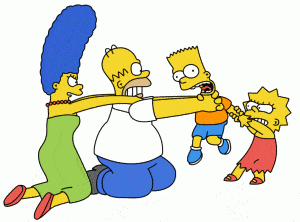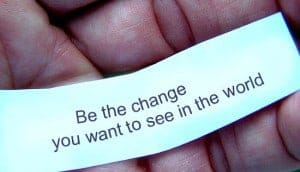
You hear a lot of shares in 12-step world about crazy or traumatic “family stuff,” especially around holiday season. Drunkenness, dysfunction, shouting, fighting, relapses: much of it isn’t pretty, and often people decide to either push through it or avoid it altogether.
But a therapist I’ve done some work with, who also has a great podcast called Online Recovery Support Radio, keeps using the phrase “step into it” about things that make us feel uncomfortable. He also talks about trauma and “character defects” as stuff that we can heal if we’re ready – a healing that leads to a much better place.
Now, my family is almost nothing like the classic craziness described above. The very few alcoholics in our clan are sober, and most of us have never been shouters, especially when among the family. And there just aren’t many of us – no first cousins, for example – so our family gatherings are really pretty chill. Externally.
However, going in with the “stuff to heal” attitude, I have noticed on my last few trips that some of my “stuff” originated in this little group of people we call “family.” That’s not a blame thing (more on that in a bit) but it is interesting to see where it came from. Interesting, and also useful, because it removes the blame I lay on myself for having my stuff, and it also shows me the space between the real me and the stuff.

For example, some of the messages I heard as a child – never explicit, but it got through anyway – were that I wasn’t very important, didn’t have the right value system, was screwing up both little and big thigns, and that all these things together were making people unhappy. (I am trying to write this as anonymously as I can!)
Now, assuming that most people don’t really change their behavior too massively, and also assuming that all of us family members basically revert to family type when among the family, I think I can look at my family today, imagine myself as a little kid in that environment, and then imagine – or really remember – what effect all this might have on said little kid. (In fact, since I too revert to that little kid in many ways, I can actually feel what’s happening to that kid!)
For example, let’s say somebody in that kid’s life likes to make fun of people, even to their faces, and very often tells them they’re screwing something up. It may be subtle, or not, but it’s constant. That little kid might internalize those messages and carry them with him as a harassing inner voice. Or let’s say that kid expresses his desires for life, his values if you will, and is told they are silly and won’t lead to a happy, successful life. He would probably start to seriously question, even supress, his intuitions. And let’s say there are some super chatty, outgoing, attractive people in that family, and there isn’t really room for that (plain-looking) kid to get a word in. He might start thinking he isn’t important to other people. And let’s say that another person tells him that his actions/inaction/values/whatever are making that person unhappy. Kid might grow up feeling guilty a lot, even when he can’t figure out what he feels guilty for.

So, what do you suppose a kid coming out of that situation might do? Well, I can tell you that the kid who grew into this adult basically did this, roughly in order:
- Accepted his role and relative place in life: Stay quiet and out of the way, because you’re not too interesting and will probably screw up whatever you try.
- Got locked up inside his head, questioning everything and constantly giving himself shit.
- Resented the hell out of this situation, and the people who put him there – even while agreeing with them!
- Longed for escape, first into imagination (where he’s a really cool guy), then into travel (“They don’t know who I am here!”), then into drugs and alcohol, then into all of them at the same time. Later in life, he will mainly try getting really, really busy. And porn.
- (Aside: Some folks respond to this with anger, others with depression, etc. Just happens that I went with despair and escape, but another thing about being around family and in recovery is to see how others deal with basically the same thing.)
- Eventually the drugs and alcohol take their own toll, the running stops working, and the kid hits bottom and winds up in a 12-step program. He is, in short, pretty lucky this way. He could have died.
- Next he works the Steps, does an inventory, and starts to figure some things out, like “My family may have ‘done’ this to me, but they didn’t mean it personally, and anyway, I can undo it.”
- He also realizes that he can’t undo (heal) it if he keeps running away from it. He needs to face it, most especially within himself.
This last one reminds me of one of my favorite recovery stories: Guy does his 4th Step and can’t wait to share it with his sponsor. He figures he’s building a case against his dad, who completely screwed him over. So he goes through it with his sponsor, and his sponsor says, “Well, your dad completely screwed you over! I am completely convinced of this.” The guy, of course, felt all vindicated and satisfied. And then the sponsor said, “The question is, what are you going to do about it?”

See, I could go on accepting this story about me not being important, having the wrong values, screwing up, dying alone, whatever … or I could step out of it for a moment and say, “Okay, my family did the best they could with what they had, which after all is simply what they had been given. Now I have what I have, and it’s up to me to heal it – or go on being the same kind of miserable that I’ve been for so long.”
Again, this is the exact opposite of blaming my family, or society, for my problems. It’s the exact opposite of playing victim. As my sponsor liked to say, my family would have done the same thing to anybody. It was nothing personal. Now let’s heal it, so we can be happy, joyous and free – as well as stop the cycle. We can actually be the ones to heal and transcend this stuff, and also the ones who take it out of the chain of inheritance.
What a miracle! If only we’ll open our eyes, stop blaming and playing victim, step into our “stuff,” and do the work.









